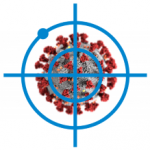 On August 23, 2020, the U.S. Food and Drug Administration (FDA) issued an emergency use authorization (EUA) for investigational COVID-19 convalescent plasma (CCP) for the treatment of COVID-19 in hospitalized patients. CCP is human plasma collected by FDA-registered blood establishments from individuals whose plasma contains anti SARS-CoV-2 antibodies, and who meet all donor eligibility requirements and are qualified. Titer levels of anti-SARS-CoV-2 antibodies are determined by the Ortho VITROS SARS-CoV-2 IgG test before units of CCP are released. Units found to have a signal-to-cutoff ratio of 12 or greater qualify as High Titer COVID-19 Convalescent Plasma.
On August 23, 2020, the U.S. Food and Drug Administration (FDA) issued an emergency use authorization (EUA) for investigational COVID-19 convalescent plasma (CCP) for the treatment of COVID-19 in hospitalized patients. CCP is human plasma collected by FDA-registered blood establishments from individuals whose plasma contains anti SARS-CoV-2 antibodies, and who meet all donor eligibility requirements and are qualified. Titer levels of anti-SARS-CoV-2 antibodies are determined by the Ortho VITROS SARS-CoV-2 IgG test before units of CCP are released. Units found to have a signal-to-cutoff ratio of 12 or greater qualify as High Titer COVID-19 Convalescent Plasma.
Based on scientific evidence available, the FDA concluded CCP may be effective in treating COVID-19, and that the known and potential benefits of CCP outweigh the known and potential risks of the product. The EUA authorizes the distribution of COVID-19 convalescent plasma in the U.S. and its administration by health care providers, as appropriate, to treat suspected or laboratory-confirmed COVID-19 in hospitalized patients with COVID-19.
Data obtained from the ongoing National Convalescent Plasma Expanded Access Protocol (EAP) sponsored by the Mayo Clinic was included in FDA assessment. This uncontrolled, single-arm study was established in April 2020 to provide access to COVID-19 convalescent plasma in hospitalized subjects with severe or life-threatening COVID-19 or judged by the treating provider to be at high risk of progression to severe or life-threatening disease. As of August 13, 2020, over 90,000 patients have been enrolled. Data from the EAP posted online on August 12, 2020 reveals trends toward reduced mortality when patients receive CCP with higher antibody levels and at earlier time points. According to FDA’s decision memorandum:
- In the subset of non-intubated patients, there was a 21% reduction in 7-day mortality (from 14% to 11%, p=0.03) in subjects transfused with high versus low titer CCP.
- In the subgroup of patients less than 80 years of age who were not intubated and who were within 72 hours of diagnosis, a significant reduction in 7-day mortality from 11.3 to 6.3% (p = 0.0008) was observed when titers are binned to low versus high.
- Survival trends observed at 7 days persisted over a longer time period, with significantly improved survival in non-intubated patients (p=0.032) and a larger benefit in the subset of patients not intubated at the time of treatment, less than 80 years of age, who were treated within 72 hours of diagnosis (p=0.0081)
However, there was no difference in 7-day survival in the overall population between subjects transfused with high versus low titer CCP, and there was no apparent association between neutralizing antibody titers and 7-day mortality in intubated subjects.
Information from the EUA and clinical studies of CCP may inform the development of other biologic COVID-19 interventions, such as recombinant anti-SARS-CoV-2 antibodies. The Antibody Society is currently tracking 10 such antibodies in clinical studies or with clinical studies pending. We will report on the progress of these molecules and other COVID-19 interventions in the future.

